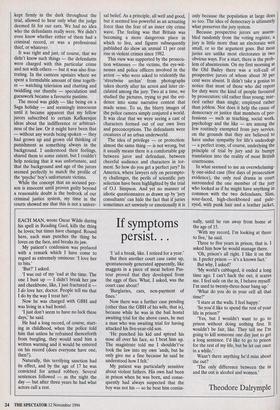If symptoms
persist. . .
EACH MAN, wrote Oscar Wilde during his spell in Reading Gaol, kills the thing he loves; but times have changed. Round here, each man punches the thing he loves on the face, and breaks its jaw.
My patient's confession was prefaced with a remark which I have come to regard as extremely ominous: 'I love her to bits.'
`But?' I asked.
`I was out of my 'ead at the time. The one I bust up ŌĆö I didn't break her jaw and cheekbone, like, I just fractured it I do love her, doctor. People tell me that I do by the way I treat her.'
Now he was charged with GBH and was living in a bail hostel.
`I just don't seem to have no luck these days,' he said.
He had a long record, of course, start- ing in childhood, when the police told him that unless he refrained thenceforth from burgling, they would send him a written warning and it would be entered on his record (does everyone have one, then?).
Naturally, this terrifying sanction had its effect, and by the age of 17 he was convicted for armed robbery. Several sentences followed ŌĆö as the night the day ŌĆö but after three years he had what actors call a rest. `I 'ad a break, like. I retired for a year.'
But then another court case came up, spontaneously generated apparently, like maggots in a piece of meat before Pas- teur proved that they developed from the eggs of flies. What, I asked, was the court case about?
`Burglaries, cars, non-payment of fines.'
Now there was a further case pending (other than the GBH of his wife, that is), because while he was in the bail hostel awaiting trial for the above cases, he met a man who was awaiting trial for having attacked his five-year-old son.
`He punched his kid and spread his nose all over his face, so I beat him up. The magistrate told me I shouldn't've took the law into my own 'ands, but he only give me a fine because he said he understood how I felt.'
My patient was particularly sensitive about violent fathers. His own had been in prison when he was born, and conse- quently had always suspected that the boy was not his ŌĆö so he beat him contin- ually, until he ran away from home at the age of 15.
`With my record, I'm looking at three to five,' he said.
Three to five years in prison, that is. I asked him how he would manage there. `Oh, prison's all right. I like it on the in. I prefer prison ŌĆö it's a known fact.' But why, I asked?
`My world's cabbaged, it ended a long time ago. I can't hack the out, it scares me. I feel safe on the in, I behave myself. I'm used to twenty-three-hour bang up.'
`What do you do in your cell all that time?'
`I stare at the walls. I feel happy.'
`So you'd like to spend the rest of your life in prison?'
`Yes, but I wouldn't want to go to prison without doing nothing first. It wouldn't be fair, like. They tell me I'm going to kill someone one day just to get a long sentence. I'd like to go to prison for the rest of my life, but be let out once in a while.'
Wasn't there anything he'd miss about the out?
`The only difference between the in and the out is alcohol and women.'
Theodore Dalrymple


































































 Previous page
Previous page